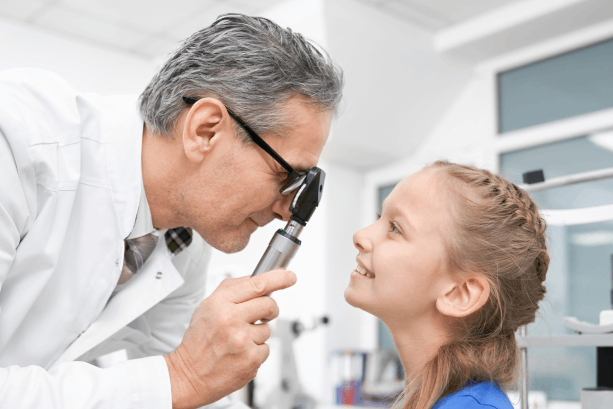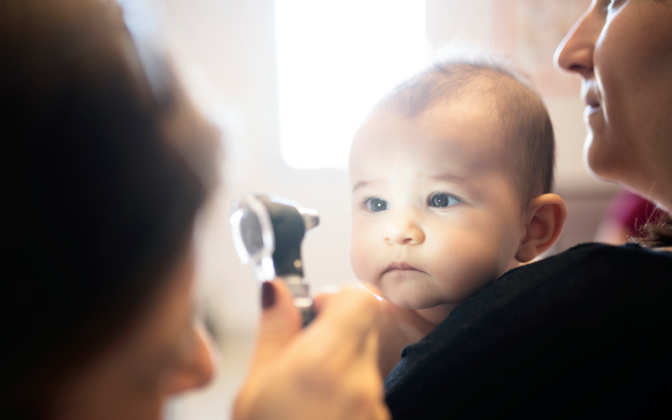Buy one pair of eyeglasses, get a second pair 50% off!
*Restrictions apply. Click here for details.
What to Know About Going to a Kids' Eye Doctor
When you have concerns about your child's vision, your pediatrician may recommend you make an appointment with a kids' eye doctor. You may also seek out a kids' eye doctor if your child experiences an eye injury. You might also notice that your child’s eye alignment isn’t straight. A pediatric eye doctor can help if one or both of their eyes turn inward or outward instead of straight ahead. Because kids are generally healthy, you may not have anticipated the need to visit a specialist for your child, not even an eye doctor. But managing your child's eye health is important.
If your child can't make out the words printed in a textbook or see what the teacher writes on the board, they may have trouble learning at school. Eye injuries that are left untreated may cause long-term vision and learning problems. Here's what you should know about what to expect from a kid’s eye exam at Nationwide Vision.
What You Can Expect at a Kid's Eye Exam
Dr. Amanda Bissell discusses why it's important for your kids to get eye exams, when you should take them to the doctor, and what to expect during a kid's eye exam.
Reasons to see a kids' eye doctor

All children should receive a vision screening from either a pediatrician or eye doctor before their first birthday, between the ages of 3 and 5 and again at age 5. Children who were born prematurely may have vision issues and may also need a comprehensive eye exam from a kids' eye doctor.
If you notice your child seems unable to see things that are close or far away, it's worth mentioning to your pediatrician, who may suggest that you see an eye doctor.
Often, these regular screenings can be completed by a pediatrician. Sometimes, though, a pediatrician may recommend that you take your child to an eye doctor after they screen your child's vision during a wellness visit. Nationwide Vision specializes in pediatric eye care that can't be performed in a standard check-up.
A pediatrician may refer your child to an eye doctor for other reasons, including a lazy eye (amblyopia) or a family history of vision problems. Kids with diabetes should see an eye doctor annually to keep tabs on their eye health, since diabetes complications may cause vision problems. It is also important for your child to see an eye doctor anytime they injure an eye.
It is also possible that a school nurse suggests you make an appointment with an eye doctor after a vision screening at school. Other times, teachers may tell parents that students squint when looking at the board.
What to expect during your child's eye exam
A child's eye exam at Nationwide Vision has some similarities to the eye exams that you may get, but there are also some differences.
Younger children who are unable to read may need to identify pictures instead of letters during vision screenings. The eye doctor may have your child look at moving images on a computer monitor or use handheld devices to assess their eye function. They may also test your child's vision with interactive play, holding up a toy so that your child can track it as the doctor moves it around.
Your child may or may not need drops to dilate their eyes during an exam. The doctor may use smaller, less intimidating tools to check your child's vision, such as a handheld, wand-size retinoscope instead of the larger phoropter that adults look through.
Kids' eye doctors also screen children for various eye conditions that could affect their vision as they grow. The pediatric eye doctors at Nationwide Vision perform a variety of these tests to ensure that all parts of your child's vision are tested. Proper vision care from a young age sets your eyes to be healthy throughout your life.
How to find a kid-friendly eye doctor

If your child needs to see an eye doctor, consider looking for someone who specializes in treating kids or for someone who sees pediatric patients regularly and knows how to make your child feel comfortable during an eye exam. The best kids' eye doctors are patient, comfortable talking to children and able to incorporate games or other fun aspects into an exam.
Some eye doctors who treat children have received extra training. Pediatric ophthalmologists have graduated from medical school, completed a residency in ophthalmology and completed a fellowship training in pediatric ophthalmology. Pediatric optometrists have graduated from optometry school and completed a residency in pediatric optometry.
You can ask your pediatrician or health insurance company for eye doctor recommendations. If your friends' children wear glasses, you may want to ask them to refer you to someone they like.
Schedule a Kid's Exam Today

Nationwide Vision is staffed with doctors who specialize in eye exams for infants and toddlers and also older children. Find a location near you and schedule an appointment today.
